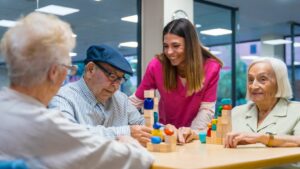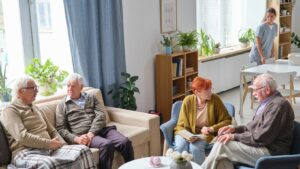Creating an engaging activity calendar for elderly residents in nursing homes is crucial for enhancing their quality of life and fostering a sense of community. Thoughtfully planned activities can stimulate the mind, encourage social interaction, and provide much-needed physical exercise. With the right mix of events, caregivers can ensure that residents remain active and fulfilled throughout the year.
An effective activity calendar doesn’t just fill time—it enriches lives. By focusing on creativity, inclusivity, and adaptability, nursing homes can create a vibrant environment where residents feel valued and engaged.
Elderly Nursing Home Activity Calendar Ideas

Activity calendars play a critical role in nursing homes by providing structure and enhancing residents’ quality of life. These calendars ensure a balanced routine, incorporating both leisure and therapeutic activities. Each elderly nursing home benefits from a well-crafted calendar that considers residents’ preferences and capabilities. With diverse options like group exercises, music sessions, and art classes, residents experience improved mental and physical well-being.
Activity calendars also foster a sense of community among seniors. By participating in shared activities, residents build relationships and engage more socially. Consistent engagement aids in reducing feelings of isolation common in nursing home settings.
Staff use these calendars to plan and organize resources effectively. Efficient planning guarantees that every elderly nursing home has the necessary materials and qualified personnel for each scheduled activity. This preparation promotes seamless execution of activities that cater to diverse interests.
Key Benefits for Nursing Home Residents

Nursing home activity calendars offer several advantages. First, they enhance mental health by engaging residents in stimulating activities, such as puzzle-solving and book clubs. Regular participation in these activities reduces feelings of loneliness and promotes cognitive retention.
Physical benefits abound as well. Gentle exercises, like tai chi and chair yoga, improve mobility and strength, helping seniors maintain independence. Group exercises on the activity calendar encourage participation, fostering a supportive community.
Social interaction is another crucial benefit of these calendars. Social activities, such as dance nights and cooking classes, create opportunities for residents to form meaningful connections. New friendships often arise, reducing social isolation and enhancing emotional well-being.
Lastly, a diverse activity calendar bolsters residents’ sense of purpose. Art projects and music sessions enable creative expression, feeding the soul and providing fulfillment. Having a variety of choices ensures that all residents find activities that cater to their preferences, enriching their daily experience.
Creative Activity Ideas

Exploring creative activity ideas for nursing home residents enriches their experience and fosters a vibrant community. Art workshops, featuring painting and pottery, allow seniors to express creativity and hone fine motor skills. Music sessions, where residents play instruments such as drums or engage in sing-alongs, boost mood and social interaction.
Gardening clubs form another excellent option, connecting seniors with nature while providing a sense of accomplishment. Incorporating technology-based activities like virtual reality experiences can engage residents in exploring new environments. Storytelling circles let residents share life experiences, enhancing memory and fostering connections.
Interactive games, such as trivia or bingo, incorporate cognitive stimulation and fun. Collaborating on group murals empowers residents to create a visual legacy that decorates nursing home spaces. Creative activity ideas should aim for inclusivity and adaptability, ensuring residents’ varied interests and abilities are considered.
By implementing diverse creative activity ideas, nursing homes create environments where seniors find joy and inspiration daily.
Tips for Personalizing Activities
Personalizing activities in nursing homes can significantly enhance residents’ engagement and satisfaction. By considering individual preferences and abilities, staff can create a more inclusive and enjoyable environment. It’s crucial to gather feedback from residents and their families to tailor activities that resonate with their interests and needs. Encouraging resident participation in planning can also foster a sense of ownership and community involvement. Additionally, incorporating seasonal and cultural events ensures that the calendar remains dynamic and relevant. By focusing on personalization, nursing homes can offer a more fulfilling and meaningful experience for their residents, promoting overall well-being and happiness.
